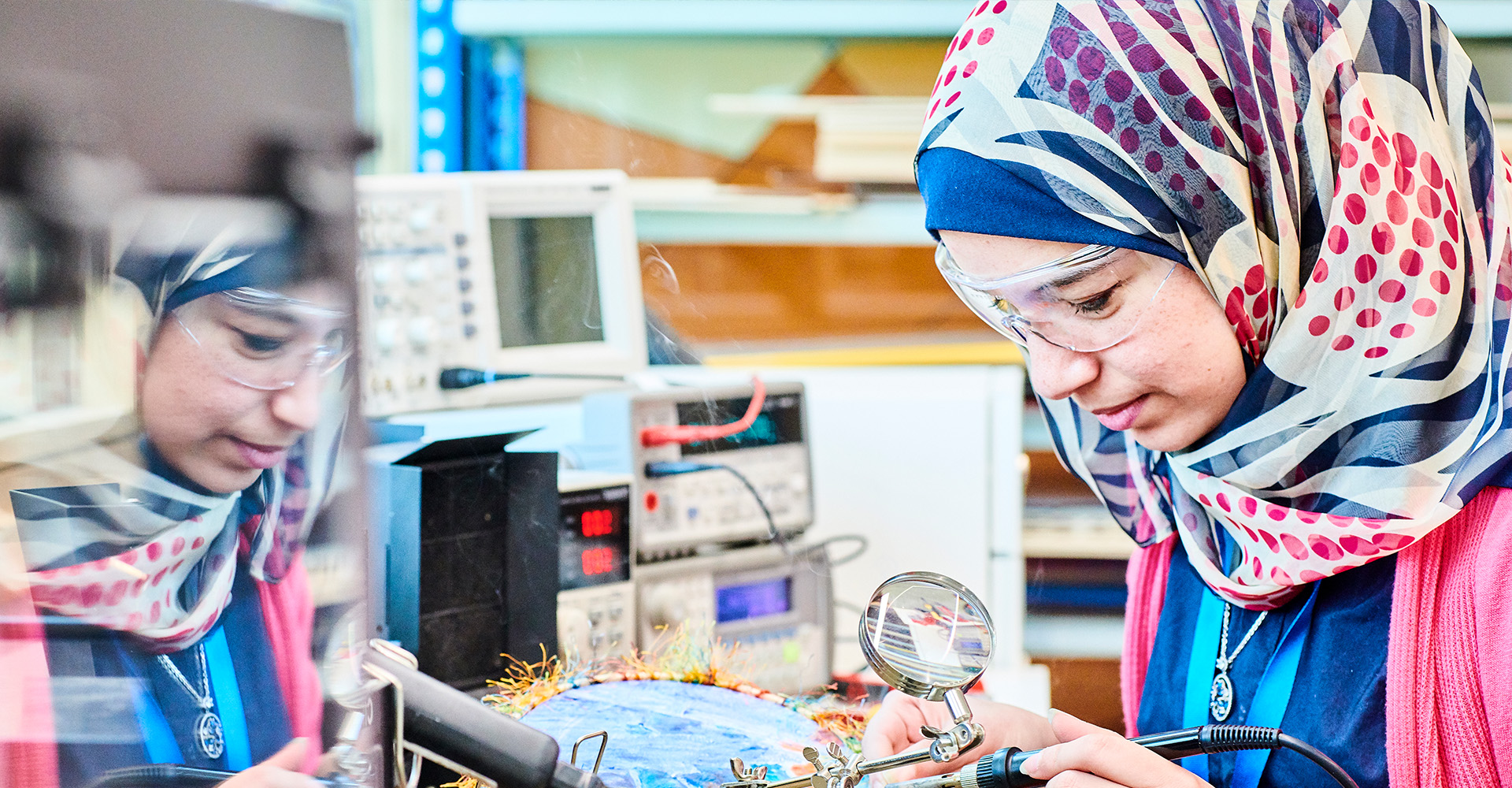Science, Computing, Engineering & Mathematics International Foundation
This course prepares you for an undergraduate degree in a range of science and engineering subjects at Newcastle University. This course is full time for three or four terms.
Course overview
Interested in progressing to Year 1 of an Science or Engineering degree?
This course provides a route into a range of science and engineering subjects. You will explore key concepts in mathematics for physical sciences and engineering.
Practical learning supplements your theoretical studies. This includes field trips and laboratory work where you will gain hands-on experience.
This course is suitable if you:
- need to improve your English language study skills within the context of science and engineering
- want to increase your subject knowledge of science and engineering
Expand your skills and knowledge by covering topics such as:
- core methods of calculus, differentiation and integration
- algebra, geometry and numerical methods
- specialist modules in chemistry, physics or computing
You'll also learn how to research, analyse and present your work effectively.
Successful completion of this course will lead to you being awarded our International Foundation Certificate (RQF Level 3).
Progression
You're guaranteed a place on one of our designated undergraduate degrees at Newcastle if you successfully complete the International Foundation in Physical Sciences and Engineering.
As a successful pathway student, you’ll have access to a number of Newcastle progression options. Each progression option will follow a specific pathway and specific requirements for both English/study skills and overall grade. You’ll also find some courses have specific requirements, such as:
- successfully completing an interview;
- having previously studied a relevant discipline;
- having previously completed a degree; or
- having IELTS 6.0 or equivalent in English language
Your progression options
Mathematics and statistics
- Computing and Mathematics BSc Honours (GG40)
- Data Science BSc Honours (G200)
- Mathematics BSc Honours (G100)
- Mathematics MMath Honours (G103)
- Mathematics and Statistics BSc Honours (GG13)
- Mathematics and Accounting BSc Honours (NG41)
- Mathematics and Economics BSc Honours (GL11)
- Mathematics with Finance BSc Honours (G1N3)
- Mathematics with Business BSc Honours (G1N4)
- Psychology and Mathematics BSc Joint Honours (C8G1)
Physics
Chemistry
- Chemistry BSc Honours (F100)
- Chemistry MChem Honours (F103)
- Chemistry with Medicinal Chemistry BSc Honours (F151)
- Chemistry with Medicinal Chemistry MChem Honours (F123)
Computer Science
- Computing and Mathematics BSc Honours (GG40)
- Computer Science BSc Honours (G400)
- Computer Science (Game Engineering) BSc Honours (G450)
- Computer Science (Cyber Security) BSc Honours (I195)
- Computer Science (Software Engineering) BSc Honours (G600)
Mechanical engineering
Chemical engineering
Civil engineering
- Civil Engineering BEng Honours (H200)
- Civil Engineering MEng Honours (H290)
- Civil and Structural Engineering BEng Honours (H210)
- Civil and Structural Engineering MEng Honours (H242)
Electrical and electronic engineering
- Electrical and Electronic Engineering BEng Honours (H607)
- Electrical and Electronic Engineering with Industrial Project MEng Honours (H605)
- Electronics and Computer Engineering BEng Honours (H652)
- Electronics and Computer Engineering with Industrial Project MEng Honours (H654)
Naval architecture and marine engineering
Quality and ranking
Subject-based rankings
- 12th in the UK – The Guardian University Guide 2025 (Civil Engineering category)
- 16th in the UK – Sunday Times Good University Guide 2025 (Chemical Engineering category)
- 24th in the UK – The Complete University Guide 2025 (Chemistry category)
- Top 145 for Engineering and Technology - QS World University Rankings by Subject 2025
- Top 150 for Engineering - Chemical - QS World University Rankings by Subject 2025
- Top 150 for Engineering - Civil and Structural - QS World University Rankings by Subject 2025
- Top 170 for Computing Science and Information Systems - QS World University Rankings by Subject 2025
- Top 200 for Engineering - Electrical and Electronic - QS World University Rankings by Subject 2025
- Top 200 for Statistics and Operational Research - QS World University Rankings by Subject 2025
- Top 250 for Engineering - Mechanical, Aeronautical and Manufacturing - Mechanical - QS World University Rankings by Subject 2025
University-wide rankings
- Global Top 140 University - QS World University Rankings 2026
- 65% increase in research power since 2014 – Research Excellence Framework 2021
- 42% of our research is classified as 4* world-leading research – Research Excellence Framework 2021
- Global Top 170 University - Times Higher Education World University Rankings 2024
Core modules (80 or 100 credits)
Study Skills and ICT (20 credits)
This module is designed to help you adjust to the specific nature, demands and expectations of UK higher education.
The skills covered include:
- taking notes in lectures and making notes from texts
- library and information skills
- using and interpreting data
- planning, preparing and checking assignments
- team-working skills
- oral presentation skills
- seminar skills
- examination and revision techniques
- proofreading
- using dictionaries and academic reference books
- information literacy and time management
You'll also develop competence in core ICT skills including the use of Word, Excel, PowerPoint, graphs and interpreting data, and web-based learning systems.
English for Academic Purposes (20 or 40 credits)
This module is designed to help you develop your skills and confidence in academic English. Four key skill areas are developed in an integrated and task-oriented way:
- reading
- writing
- listening
- speaking
The module will encourage you to take responsibility for your learning and a lot of emphasis is placed on:
- private study
- student research
- student-led presentations
- seminar discussions
- e-learning
- group work
Mathematics for Physical Sciences and Engineering 1 (20 credits)
This module is designed to develop your competence in several important areas of mathematics: algebra, geometry and numerical methods.
The algebra topics include the study of functions, graphs and complex numbers. You'll learn how to solve equations which don't have exact solutions - an area called numerical mathematics.
Mathematics for Physical Sciences and Engineering 2 (20 credits)
This module includes some elementary topics from algebra and trigonometry. It introduces the core methods of calculus, differentiation and integration.
You'll learn how calculus can be used to find the optimal solution to problems in science and engineering and discover several key applications of integration.
In the final stage of the module you'll see how calculus can describe mechanical systems exhibiting simple harmonic motion and circular motion.
Specialist modules (20 or 40 credits)
Physics (20 credits)
This module builds on basic physics knowledge to develop the descriptive and mathematical understanding of the principles required for studying physical sciences and engineering at higher levels.
It combines theoretical principles, practical applications and laboratory work.
Chemistry (20 credits)
You will be expected to have a basic grounding in chemistry.
This module develops the concepts in physical, inorganic and organic chemistry required for studying at degree level in physical sciences, engineering or biological sciences.
It also includes laboratory and project work to supplement theoretical studies.
Principles of Computing (20 credits)
This module provides a foundation knowledge and understanding of a range of computing skills.
It enables you to develop skills for planning and designing systems and/or software.
Teaching and assessment
Teaching
Class hours: 26 hours per week minimum
Class sizes: Average of 20 students per class for English language teaching
Age requirement: 17 years and above
Assessment
Entry to all honours degrees at Newcastle University is highly competitive, and students hoping to progress to Newcastle must maintain high standards throughout their programme.
Whilst your grades in the Foundation programme do not count towards the final degree, your performance will be used to determine whether you meet the specified progression grades for direct entry to your chosen degree at the University. Assessment is both formal and informal.
Informally you will be given advice and feedback throughout your programme from your teachers. You will also be assessed via a combination of examinations at the end of each semester and coursework including
- a design portfolio
- design project
- sketch books
- written essays
- reports
- practical exercises
- group and individual research projects
- bibliographical searches
- oral and video presentations
- problem solving
Careers and employability
With 5 QS Stars for Student Employability (2024), Newcastle University consistently has one of the best records for graduate employment in the UK.
We provide an extensive range of opportunities to all students through an initiative called ncl+. This enables you to develop personal, employability and enterprise skills and to give you the edge in the employment market after you graduate.
Our Careers Service is one of the largest and best in the country, and we have strong links with employers.
Find out more about careers and employability at Newcastle University.
Entry requirements
To study on this course you need to meet the following entry requirements.
All candidates are considered on an individual basis. If your qualifications are not listed here, please see our additional entry requirements web pages to find out which other qualifications are considered.
The entrance requirements below apply to 2024/2025 entry.
English requirements
Three term: a minimum of IELTS 5.5 (with a minimum of 5.0 in all subskills) or an equivalent score
Four term: a minimum of IELTS 5.0 (with a minimum of 4.5 in all subskills) or an equivalent score
If you do not meet the minimum English language requirements you should apply for Academic English.
Additional fees
Laboratory fee: £500
Enrolment fee: an extra charge of £250 per academic course, charged on confirmation
Text books: £75 - £415
Accommodation is not included in the fees. View your Newcastle University International Study Centre accommodation options.

